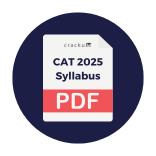The following table represents addition of two six-digit numbers given in the first and the second rows, while the sum is given in the third row. In the representation, each of the digits 0, 1, 2, 3, 4, 5, 6, 7, 8, 9 has been coded with one letter among A, B, C, D, E, F, G, H, J, K, with distinct letters representing distinct digits.

Which among the digits 3, 4, 6 and 7 cannot be represented by the letter D?
Correct Answer: 7

The value of F can only be 0 as F+F=F can only hold if F=0.
Also, A can only be 1(in the second column) because to get a carry of more than 1, B has to be a double-digit number which is not possible. (A carry is a digit that is transferred from one column of digits to another column of more significant digits.)
So the data can be tabulated as follows:

Since the last row in the third column is 0, the carry to the second column must have been 1, Hence B+1+1=11 => B=9
In the 4th column, H+H = 10 since a carry 1 has gone to the 3rd column. Hence H=5.
G+K must be 11 and the carry 1 goes to the next column, so C=1+1=2.
Now, G,K can take values (3,8), (4,7) and (5,6) in any order.
From 5th column G=J+1 => J=G-1
Case: G=3 and K=8, here J =2 which is not possible as C =2
Case: G=8 and K=3, J=7, a possible case.
Case: G=4 and K=7, J=3 possible
Case: G=7 and K=4, J=6 possible
Case: G=5 and K=6, J=4 not possible as H =5.
Case: G=6 and K=5, J=5 both J and K are same, not possible.
Hence the cases can be tabulated as follows:



In all possible cases 7 is already represented by a letter other than D. Hence 7 is the answer.
Video Solution

Create a FREE account and get:
- All Quant CAT complete Formulas and shortcuts PDF
- 38+ CAT previous year papers with video solutions PDF
- 5000+ Topic-wise Previous year CAT Solved Questions for Free




